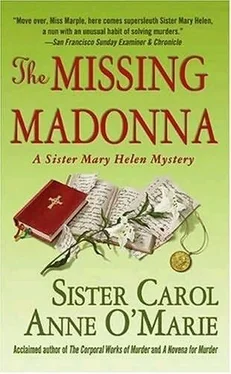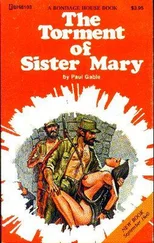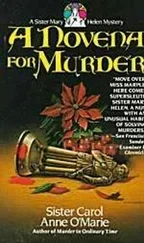He must not have visited the Mission District, sheltered as it was from the ocean, in the lap of Twin Peaks. The weather there was always mild. Why, an island of palm trees ran down the middle of Dolores Street. It could have been Los Angeles!
The two nuns paused for a moment to look at the whitewashed adobe Mission San Francisco de Asis, probably the oldest building in the City. Adjacent to it, and at least four times its size, was Mission Dolores Basilica.
In the alcove atop its towering facade, junipero Serra stood, in full Franciscan habit, looking down. His stone hands were clasped behind his back. Mary Helen wondered crazily what the saintly friar must be thinking about up there, gazing down on all he had started.
Before the light turned green, a Grayline tour bus pulled up to the curb. Japanese tourists, complete with sun hats and cameras, filed off the bus.
“They must have emptied an entire village,” Mary Helen murmured to Eileen.
“Do you still want to sightsee, old dear?”
“Why don’t we have a little lunch first?” Mary Helen glanced in the general direction of her wristwatch, hoping Eileen was hungry and wouldn’t notice that it wasn’t yet eleven o’clock. “There are lots of quaint little places in this neighborhood.”
Mary Helen drove up 16th a few blocks and turned left on Sanchez. Slowly she cruised the street.
“Where in the name of God are you going?” Eileen turned in the passenger’s seat to look at her. “You have passed three delis, two coffee shops, a health-food restaurant, and Just Desserts is right behind us on Church Street.”
Her eyes narrowed. “Mary Helen, if it is not too much to ask, what are you up to, exactly?”
“There’s where Erma lives.” Mary Helen pointed to a small two-story building on the corner. The first floor housed a storefront. Above it were living quarters. A string of carved rosettes ran between the curtained square bay windows. Probably in the twenties, the greengrocer or the butcher and his family had lived there, over their shop. Today, the shop had been converted to a trendy-looking restaurant with ALPHONSO’S BISTRO written in white script on its awning. The top story had probably been divided into apartments.
Eileen folded her arms and stared straight ahead. “I wondered what all this was about,” she said. “I should have known. You just could not wait until Erma called.”
For a moment Mary Helen was hurt. This wasn’t a matter of impatience or even curiosity. This was a matter of genuine concern. While she took several tries at parallel parking, she told Eileen about Caroline’s phone call. Eileen followed her across the street, muttering apologies that Mary Helen graciously accepted.
The mailboxes by the front door told them that the upper floor had been divided into two apartments-Erma’s and one belonging to an A. Finn. Mary Helen pushed Erma’s doorbell and waited. She pushed it again and held it a little longer. Still no answer.
“She’s not at home,” she said, managing to push A. Finn’s bell before Eileen noticed. When A. Finn didn’t answer either, Mary Helen walked toward the restaurant’s side window.
Inside, everything was dark. Obviously the bistro had not yet opened for lunch. Putting her face to the window, Mary Helen cupped her hands around her eyes. There was a crack of light coming from under a door in the back. Someone was in there. With her car keys she tapped on the plate glass.
“What are you doing?” Eileen had caught up with her.
“There’s someone in there,” Mary Helen answered without taking her face away from the window. “Maybe he-or she-saw Erma today. Leaving her apartment, or something.”
“From the back of the restaurant? With the door closed?”
Ignoring her friend, Mary Helen watched a door at the far corner of the darkened room swing open. A squat man crossed the room, wiping his hands on his spotted butcher’s apron.
Frowning, he pointed to the red CLOSED sign still hanging on the glass door.
Mary Helen waved. For a moment the man squinted at her. She could almost see his mind working. Two old ladies in blue tailored suits, no makeup, no jewelry, small crosses on the left lapel.
“Oh, Sister!” He unlocked the glass front door. “Sorry,” he said, opening it, “we don’t start to serve until eleven-thirty.” He glanced at his watch. “About twenty minutes. You want to come in and wait?”
“We’re not here to eat, really,” Mary Helen said, trying not to stare at the top of the man’s head, although it was difficult not to. His pate was bald, yet one long piece of hair had been stretched back and forth in a series of V’s across his crown. The top of his head looked for all the world like someone had threaded half a black shoelace, then plastered it all down with brilliantine.
Eileen nudged her. “We were wondering if you had seen Erma Duran this morning. The woman in the apartment above.” She pointed.
“Yeah, I know Erma, all right.” The man opened the door wide so the nuns could step inside. “She’s lived there for years. Since way before Tommy died. In fact, I’m the landlord. Own the whole building. Come on in.”
The Sisters stepped farther into the darkened bistro. The delicious smell of sautéing onions was beginning to permeate the whole room. Mary Helen’s mouth watered. Inside, small tables covered with white cloths were arranged close together. Napkins, like stiff little bishop’s miters, stood at each place. A milk-glass bud vase holding a real carnation and a frond of maidenhair was in the center of each table.
The walls were covered with deep red flocked wallpaper; the burgundy carpet was thick and plush. The whole place looked exactly as Mary Helen imagined a high-class bordello might look. Here and there an imitation hurricane lamp stuck out from the wall. Two or three large ferns in brass planters completed the decor.
“Then you’ve seen Erma today?” Eileen asked hopefully.
“No, she hasn’t been around for the last couple of days. She took off last Saturday, right after she got back from the Big Apple. Leaves me awful shorthanded. Thank God we’re closed on Mondays.” He wiped his hands on his apron again.
“Erma works for me too,” he added, in case the nuns hadn’t gathered as much. “She’s my hostess. Been doing that since before Tommy died.
“Somebody’s been trying to get her all morning too. I can hear her phone ringing, but she’s gone. To visit relatives,” the man offered before Mary Helen had a chance to ask.
Just as Caroline had said, she thought. And that caller is no doubt Lucy. Poor thing must really be concerned.
“When do you expect her back?” Mary Helen asked.
The man shook his head. Not a hair on it moved. “Don’t know, Sister,” he said sadly, “and I really miss her around the place.” He brightened. “She said she’d call and let me know.”
“Well, thank you. I hope we haven’t bothered you, Mr… Mr…” Mary Helen realized belatedly that they hadn’t even bothered to introduce themselves.
“Finn. Al Finn.” He stuck out his broad hand. “I’m Alphonso, the one on the awning.”
“Ai for Alphonso.” Eileen cocked her head and ended her sentence somewhere between a question and a statement. It was an old Irish trick that had helped her out of many a tight situation.
The man didn’t know whether to answer or explain. He chose to explain. “My name is really Aiphonsus. My folks were from the old school. You know, name a kid for the saint whose day he was born on. My birthday’s the first of August.”
“St Aiphonsus Liguori.” Eileen beamed. “You were lucky, really. You could have been born on September twenty-ninth.”
Finn looked puzzled.
“Feast of St. Michael. How would you like to have gone through life being called Mickey Finn?”
Читать дальше












